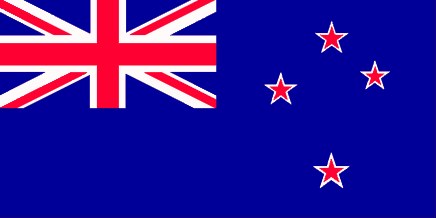|
Kaikoura
- Westport: 340 km (212 mi)
05 December 2002
We have breakfast in breakfast cafe in Kaikoura. Then we are on our
way to Westport on the West Coast. We drive through the Lewis Pass and are being
treated to magnificent scenery and fine weather. The sun is out and temperatures
rise to 26°C/79°F. 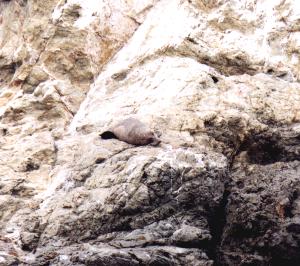 The
road follows a number of river beds along high mountains. Closer to Westport the
sky is getting more overcast, but it stays dry. In Westport we move into the The Happy Backpacker YHA hostel. We
have a twin room with a TV. After a short break we take the car to Cape
Foulwind, named that way by Captain Cook when he was confronted with adverse
gales for a couple of days in 1770. Here is a seal colony and an old lighthouse.
At night we have dinner at the only good restaurant around Westport, the Bay
House Café close to Cape Foulwind. Good food with a lovely view over
the beach, the surfers and the Tasman Sea. Back to Westport which is fairly dead
at night. The
road follows a number of river beds along high mountains. Closer to Westport the
sky is getting more overcast, but it stays dry. In Westport we move into the The Happy Backpacker YHA hostel. We
have a twin room with a TV. After a short break we take the car to Cape
Foulwind, named that way by Captain Cook when he was confronted with adverse
gales for a couple of days in 1770. Here is a seal colony and an old lighthouse.
At night we have dinner at the only good restaurant around Westport, the Bay
House Café close to Cape Foulwind. Good food with a lovely view over
the beach, the surfers and the Tasman Sea. Back to Westport which is fairly dead
at night.
Westport
- Franz Josef Glacier: 280 km (175 mi)
6 december 2002
We have breakfast at café Mandala, that is not very special at all. The coffee is bad and the food
leaves room for improvement. We drive south along the West
Coast. The West Coast is famous for its beautiful coastline and the large
yearly quantities of rain pouring down here. This part of coast sees about
2,865mm (114") of rain each year (compared to the Netherlands with 793mm
(31"))
café Mandala, that is not very special at all. The coffee is bad and the food
leaves room for improvement. We drive south along the West
Coast. The West Coast is famous for its beautiful coastline and the large
yearly quantities of rain pouring down here. This part of coast sees about
2,865mm (114") of rain each year (compared to the Netherlands with 793mm
(31"))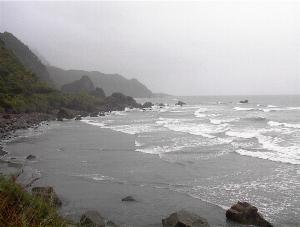 .
Further south, Fiordland gets even more than 7 metres (279") of rain each
year! That makes New Zealand's West Coast one of the wettest places on earth.
And today is no exception. The rain pours steadily down. We stop at Punakaiki to
have a look at the Pancake Rocks and the Blow Holes. These are spectacular
rocks that seem to have been formed by countless layers of "pancakes".
At high tide the water blows out through the underpasses and openings in the
rocks: "blow holes". .
Further south, Fiordland gets even more than 7 metres (279") of rain each
year! That makes New Zealand's West Coast one of the wettest places on earth.
And today is no exception. The rain pours steadily down. We stop at Punakaiki to
have a look at the Pancake Rocks and the Blow Holes. These are spectacular
rocks that seem to have been formed by countless layers of "pancakes".
At high tide the water blows out through the underpasses and openings in the
rocks: "blow holes".
The coast is pretty sight, with rocks in the water and dense rain
forest on the land. Sometimes the road veers inland and leads us into thick
forest. 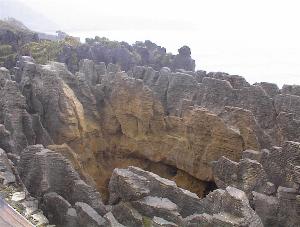 The scarce plains are occupied by cattle farms (cows, sheep, deer). We are not
making fast progress, because the road is winding quite a bit. Close to Ross a
stone hits the windscreen, which means we have to carry on with a small, yet
beautifully shaped crack in it. When we get closer to Franz Josef the
weather clears and temperatures rise to 22°C/72°F. Franz Josef is a tiny
village, owing its existence entirely to the glacier of that name. The glacier
lies on the slopes of the southern Alps. Together with neighbouring Fox glacier
these are the most spectacular glaciers of the South Island. At first the
glaciers were
The scarce plains are occupied by cattle farms (cows, sheep, deer). We are not
making fast progress, because the road is winding quite a bit. Close to Ross a
stone hits the windscreen, which means we have to carry on with a small, yet
beautifully shaped crack in it. When we get closer to Franz Josef the
weather clears and temperatures rise to 22°C/72°F. Franz Josef is a tiny
village, owing its existence entirely to the glacier of that name. The glacier
lies on the slopes of the southern Alps. Together with neighbouring Fox glacier
these are the most spectacular glaciers of the South Island. At first the
glaciers were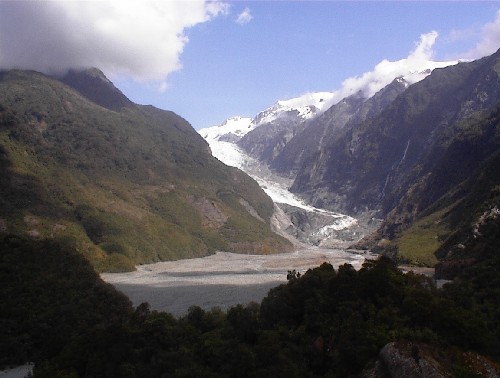 called Victoria and Albert, but in 1865 the Austrian geologist called the
northern one after the then Austrian emperor. After a visit of Prime Minister
Fox the other gletsjer got its name. The glaciers move a lot. Since Captain Cook
saw them in 1770 they have moved some 3km (2 mi) back. In 1985 they started
advancing, but after 15 years of growth they are moving back again.
called Victoria and Albert, but in 1865 the Austrian geologist called the
northern one after the then Austrian emperor. After a visit of Prime Minister
Fox the other gletsjer got its name. The glaciers move a lot. Since Captain Cook
saw them in 1770 they have moved some 3km (2 mi) back. In 1985 they started
advancing, but after 15 years of growth they are moving back again.
We
move into the new YHA-hostel, the best we have seen so far. A double room with
ensuites. There is a sauna as well. We plan to do a heli-hike, which involves
being dropped on top of the glacier with a helicopter, making a guided walk for
two hours and being picked up again by the same chopper.
We enquire at the Guiding
Company about our heli-hike tomorrow. Today, it turns out, there have not
been any flights and nothing sensible can be said about tomorrow by the staff
who seem to have university degrees in being evasive. We have a glance at the
glacier from some distance. It is a beautiful sight.
Back in the hostel we have break before w have lunch at the Blue
Ice Café. A good place to eat with a popular bar upstairs, full of adventurous
young people. I have Green Lipped Mussels followed by Whitebait - a West Coast
speciality: small eels baked in an omelette.
Later
we have a drink upstairs at the
Blue Ice bar.
7 December 2002
Last night there were heavy rain storms with thunder. This morning
it is still raining cats and dogs. Our hopes for a heli-hike today are crushed
instantly. The girl of the Guiding Company tells us that the weather is too wet
for the pilots to get out of bed this morning. A heli-hike is not on the cards
today. Tomorrow we may stand a better chance as the weather is reportedly going
to improve. "But well,... on the one hand this and on the other hand
that...nothing is certain of course". We decide to stay an extra
night in Franz Josef. We have breakfast and count our blessings for not
having booked a full day trek, because these do take place today in the pouring
rain. This to the dismay of a couple dutchmen who would have liked their money
back, considering the weather.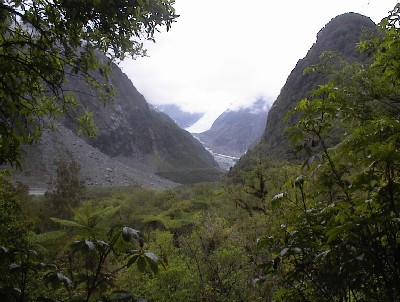 We drive around a bit, but there is nothing fun to do in this weather. The
villages North of Franz Josef are nothing much. Not even Okarito, the first spot
of New Zealand that Abel Tasman set eyes on in 1642. We drive to Fox Glacier.
That is a lot livelier. Just like in Franz Josef the town planners have tried
induce an alpine atmosphere through the architecture. In combination with the
the backdrop of the snow topped mountains they almost succeeded, but the
rainforest around it makes this area unique. We have lunch in Café
Névé (fine) and look at the Fox glacier from a lookout. We can just see it
between the clearing clouds. Meanwhile it has stopped raining and there is some
blue in the western sky. We keep on hoping for tomorrow. We drive back to the
hostel. Late afternoon we sip on some nice cocktails and later we have dinner
again in the Blue Ice Café.
We drive around a bit, but there is nothing fun to do in this weather. The
villages North of Franz Josef are nothing much. Not even Okarito, the first spot
of New Zealand that Abel Tasman set eyes on in 1642. We drive to Fox Glacier.
That is a lot livelier. Just like in Franz Josef the town planners have tried
induce an alpine atmosphere through the architecture. In combination with the
the backdrop of the snow topped mountains they almost succeeded, but the
rainforest around it makes this area unique. We have lunch in Café
Névé (fine) and look at the Fox glacier from a lookout. We can just see it
between the clearing clouds. Meanwhile it has stopped raining and there is some
blue in the western sky. We keep on hoping for tomorrow. We drive back to the
hostel. Late afternoon we sip on some nice cocktails and later we have dinner
again in the Blue Ice Café.
8 december 2002
The
sky is very promising indeed this morning. We hear the hum of helicopters above
us. Full of good hope we make for the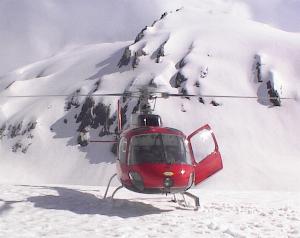 Alpine Adventure Centre,
where the Guiding Company is based. Our enthusiasm is dealt a first blow when we
are told that there is quite some wind up on the glacier and a heli-hike is not
all that certain. We have breakfast in Café Franz and
at 9:15 we get the bad news. The heli-hike has been cancelled again! We can do a
so called Snow Landing with Alpine Adventures Alpine Adventure Centre,
where the Guiding Company is based. Our enthusiasm is dealt a first blow when we
are told that there is quite some wind up on the glacier and a heli-hike is not
all that certain. We have breakfast in Café Franz and
at 9:15 we get the bad news. The heli-hike has been cancelled again! We can do a
so called Snow Landing with Alpine Adventures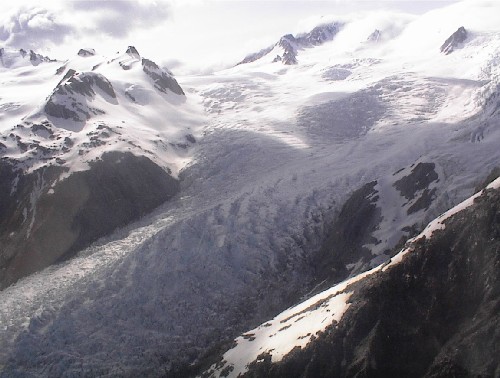 .
That is a helicopter flight over the glacier with a landing in the snow on top
of a neighbouring mountain top. We can walk around up there for about 8 minutes
after which we are flown back over the glacier into town. We can leave in 5
minutes. It is a beautiful flight, but very short. In 20 minutes were back again
and set back $150 each. .
That is a helicopter flight over the glacier with a landing in the snow on top
of a neighbouring mountain top. We can walk around up there for about 8 minutes
after which we are flown back over the glacier into town. We can leave in 5
minutes. It is a beautiful flight, but very short. In 20 minutes were back again
and set back $150 each.
Franz
Josef - Wanaka: 290 km 181 mi)
The
we have coffee before we start our drive to Wanaka. It is a lovely drive. First
a stretch along the coast and then through Haast and the Haast Pass inward. 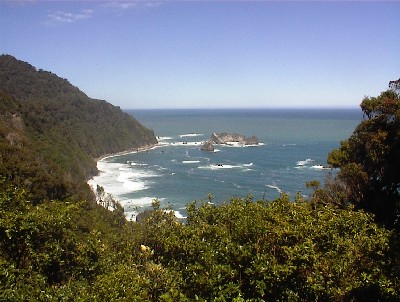 This
part of the island is very remote and deserted, with virtually no settlements at
all. We stop for a while at Knights Point for the view. Nature is very
impressive here with snow topped mountains, fast flowing rivers and lots of
green (ferns). The sun plays its part and after a good 4.5 hours we arrive at
Lake Wanaka. The town of Wanaka is
beautifully set at the lake's southern shore. Wanaka is all about tourism and
activities, but in a relaxed way. We stay at the
Purple Cow backpackers.
We take a stroll around town and have a drink enjoying the view of the mountains
and the lake. Later we have dinner at a Japanese restaurant called Sasako and
later on we drink a beer at Shooters, the most popular bar in town with a lake
view as a bonus. This
part of the island is very remote and deserted, with virtually no settlements at
all. We stop for a while at Knights Point for the view. Nature is very
impressive here with snow topped mountains, fast flowing rivers and lots of
green (ferns). The sun plays its part and after a good 4.5 hours we arrive at
Lake Wanaka. The town of Wanaka is
beautifully set at the lake's southern shore. Wanaka is all about tourism and
activities, but in a relaxed way. We stay at the
Purple Cow backpackers.
We take a stroll around town and have a drink enjoying the view of the mountains
and the lake. Later we have dinner at a Japanese restaurant called Sasako and
later on we drink a beer at Shooters, the most popular bar in town with a lake
view as a bonus.
|
